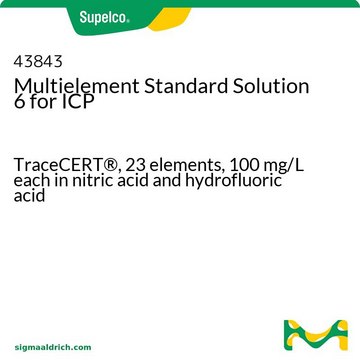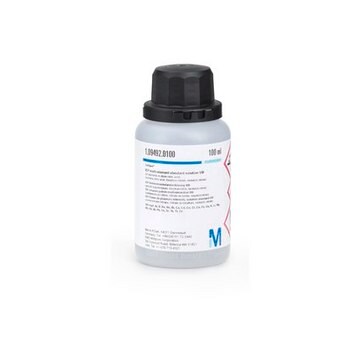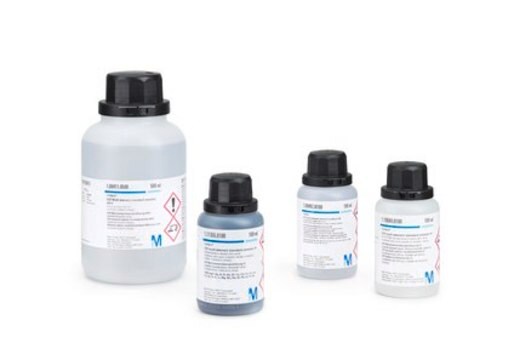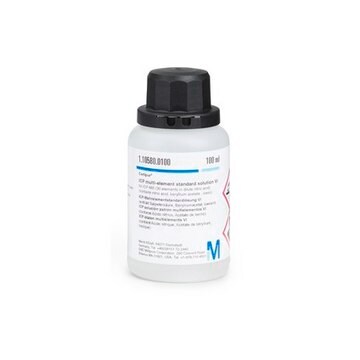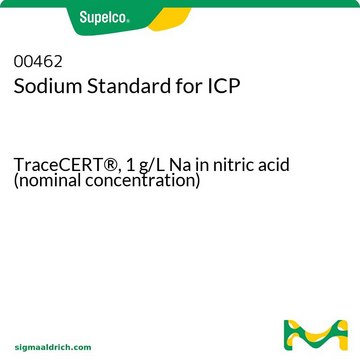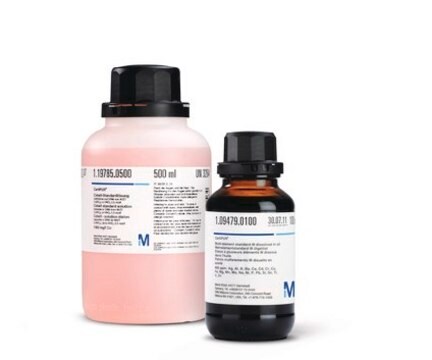1.11355
ICP multi-element standard solution IV
(23 elements in diluted nitric acid) 1000 mg/l: Ag, Al, B, Ba, Bi, Ca, Cd, Co, Cr, Cu, Fe, Ga, In, K, Li, Mg, Mn, Na, Ni, Pb, Sr, Tl, Zn Certipur®
Synonym(s):
Nota 1 A
About This Item
Recommended Products
grade
reference material
Quality Level
product line
Certipur®
technique(s)
ICP: suitable
pH
1 (20 °C in H2O)
density
1.09 g/cm3 at 20 °C
application(s)
industrial qc
pharmaceutical
format
multi-component solution
storage temp.
15-25°C
Related Categories
Application
- ICP multi-element calibration standard: The article titled "Schiff base functionalized silica gel for simultaneous separation and preconcentration of Cu(II), Ni(II), and Cd(II) in pharmaceuticals and water samples" highlights the use of ICP multi-element standard solution IV in trace metal analysis, demonstrating its critical role in ensuring the accuracy and reliability of elemental quantification in various matrices, including pharmaceuticals (Tokay and Bağdat, 2022).
- Trace metal standard for biopharmaceutical research: This standard solution is essential for the precise calibration of ICP-MS instruments used in the pharmaceutical industry, helping to meet stringent quality control standards for elemental impurities.
- Elemental impurities testing in pharmaceuticals: ICP multi-element standard solution IV is employed to verify compliance with regulatory requirements for elemental impurities in pharmaceutical products, ensuring patient safety and product efficacy.
Analysis Note
Al (Aluminium): 1000 mg/l
B (boron): 1000 mg/l
Ba (barium): 1000 mg/l
Bi (bismuth): 1000 mg/l
Ca (calcium): 1000 mg/l
Cd (cadmium): 1000 mg/l
Co (cobalt): 1000 mg/l
Cr (chromium): 1000 mg/l
Cu (Copper): 1000 mg/l
Fe (iron): 1000 mg/l
Ga (Gallium): 1000 mg/l
In (Indium): 1000 mg/l
K (potassium): 1000 mg/l
Li (Lithium): 1000 mg/l
Mg (Magnesium): 1000 mg/l
Mn (Manganese): 1000 mg/l
Na (sodium): 1000 mg/l
Ni (Nickel): 1000 mg/l
Pb (lead): 1000 mg/l
Sr (Strontium): 1000 mg/l
Tl (Thallium): 1000 mg/l
Zn (Zinc): 1000 mg/l
Other Notes
Legal Information
Signal Word
Danger
Hazard Statements
Precautionary Statements
Hazard Classifications
Aquatic Acute 1 - Aquatic Chronic 2 - Carc. 1A - Carc. 1B Inhalation - Eye Dam. 1 - Met. Corr. 1 - Muta. 1B - Repr. 1B - Skin Corr. 1B - Skin Sens. 1 - STOT RE 2
Supplementary Hazards
WGK
WGK 3
Certificates of Analysis (COA)
Search for Certificates of Analysis (COA) by entering the products Lot/Batch Number. Lot and Batch Numbers can be found on a product’s label following the words ‘Lot’ or ‘Batch’.
Already Own This Product?
Find documentation for the products that you have recently purchased in the Document Library.
Customers Also Viewed
Protocols
F&B, elemental analysis, inductively coupled plasma, regulatory, food safety, food chemistry, nutritional value.
Related Content
Atomic spectroscopy uses the energy absorbed or emitted by electrons to identify and quantify the elemental composition of a sample. It includes various analytical techniques, such as AAS, AES, FAA, GFAA, ICP-OES, ICP-MS and XRF.
Atomic spectroscopy techniques like AAS, AES, ICP-OES, and ICP-MS identify and quantify elemental composition in samples.
Our team of scientists has experience in all areas of research including Life Science, Material Science, Chemical Synthesis, Chromatography, Analytical and many others.
Contact Technical Service